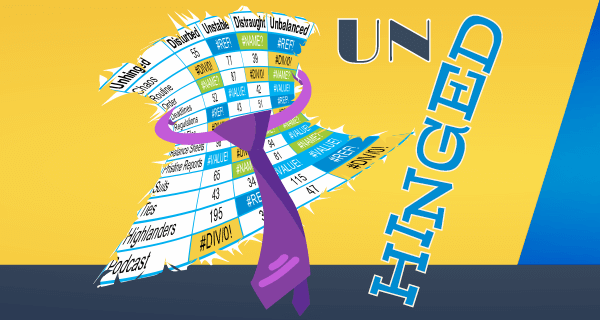Episode 4
Don’t miss out on other podcast episodes from Dean Dorton! Listen and subscribe:
Transcription
Justin Hubbard
Welcome to Unhinged, ladies and gentlemen, where nothing accounting or finance related is unapproachable. This episode of the podcast is brought to you by no one, so we are still waiting on that sponsorship money to come in. You could be the first, that would put your name prominently displayed on our t- shirts, assuming your sponsorship covers the price of the t-shirt production. So there you have it.
Today, I’m joined by John Wurtenberger. John leads the Dean Dorton audit practice. John, welcome to the show.
John Wurtenberger
Thanks for having me. I appreciate it. Could I sponsor?
Justin
We will take your money all day long.
John
I want my name on all the shirts.
Justin
There you go. Well, with a name like Wurtenberger, it would have to be a pretty big shirt.
John
It’s going to cover a couple of lines.
Justin
I’ve noticed, we’ve been on a couple of Zoom meetings, and we’re not endorsing Zoom, so no one get excited, but I noticed you list your name as John W. Is that because you want people to assume you’re John Wayne?
John
That is one of the reasons why I do that. The other reason is so I can try to pull Dean Dorton into the name, so they know what firm I’m with. But John Wayne’s cooler, so let’s go with that.
Justin
Let’s go with that. So, John, tell us about yourself.
John
So, long version or short version?
Justin
Your version.
John
My version. I like it. So let’s see. I think about it, and I think of back in the days on AOL where it was like the ASL, it was like well, I’m 33 years old and I am a male. And I live in Lexington, Kentucky.
Justin
No, No. No.
John
So I joined Dean Dorton in January.
Justin
So notice everyone that John brought COVID to Dean Dorton.
John
Yes. Yes. I actually moved from New Jersey so that even reemphasizes that I brought COVID down. So my wife and two kids, moved from New Jersey back down to Louisville to join Dean Dorton, where we’re from. Our family is all here in Louisville.
Let’s see, about me. I guess personally, I like to go back to my… I don’t do a lot of social media, so I don’t do Facebook. I don’t do Instagram. The one thing I am on is Twitter. My Twitter handle bio, I think, defines me fairly well. It says I like sour gummy worms. I like golf. I like bourbon. And the one that I’m a little bit iffy about is it says I like Excel spreadsheets. So it defines the CPA in me a little bit, but I think the sour gummy worms, the bourbon, and the golf are pretty big interests of mine.
Justin
No, that whole Excel spreadsheet comment, that was probably real cool when you wrote it, now upon a little aging…
John
The better one, and I hesitate to even bring this up, is probably the picture. If you reflect back to the trainings that you and I had recently, and the concept of jorts was brought up. I think if you check it out, you might see a nice little picture of me and my son, and I might be wearing some jorts.
Justin
Would you be willing to share your Twitter handle for the audience?
John
You can get on my Twitter handle, that’s fine. It is @jdwurt2. I told my wife I would have to give a little shout out, so my wife’s name is Jamie. I have two boys: a four-year-old and a two-year-old. Well, two-year-old, my wife’s going to get on me for saying two-year-old. He turns two in two weeks so technically he’s still one. But Gus and Tucker. I have one on the way, which we’re very excited about.
Justin
Congratulations.
John
Baby girl, first girl, due in December, and then a dog named Woodford. So, that brings us back to the bourbon.
Justin
I too had two boys and then a girl. So that little girl will be a feral animal.
John
Is that right?
Justin
Yes.
John
My second already is, so I don’t know what to expect with the third.
Justin
So let’s do a little mental gymnastics, word association.
John
Sure.
Justin
So I’ll say a word, you say whatever comes out of your mouth, don’t even think about it.
John
Okay.
Justin
Let’s start: airplane.
John
Seat.
Justin
Nineties music.
John
Will Smith.
Justin
Grasshoppers.
John
Karate kid.
Justin
PPP loans.
John
Terribleness.
Justin
Revenue recognition.
John
More terribleness.
Justin
So, for the audience, John has taken the lead, or been one of the leaders, in our efforts to understand the federal stimulus programs that have resulted from the COVID pandemic. And as leader of our audit practice he’s also all over the revenue recognition restructuring, if you will.
John
Yeah. So by me saying terribleness that’s probably not the best segue to say, “Reach out to me. I know what I’m talking about.”
Justin
He knows what he’s talking about. He just may not be thrilled to talk about that.
John
It’s just not the most exciting stuff. Listen, the thing about the PPP loans and the revenue recognition is they’re very technical. You can get very into the weeds with both those things. The thing I do like about them is I like helping people. I like answering the questions. I like people reaching out and asking us for advice. The thing I really don’t like about it is reading hundreds of pages of words and trying to keep up with all the guidance as it changes, especially on the PPP loan stuff. So that’s taken up, as Justin mentioned, a majority of my life over the past three months, which I wasn’t anticipating, but it’s all good. I know a lot about PPP loans. I know about the SBA, the treasury.gov site has been a favorite of mine on my Chrome browser, which is unfortunate but—
Justin
Shout out to Chrome.
John
Yeah. Shout out to Chrome. Shout out to treasury.gov. What, Steve Mnuchin or something? Shout out. He’s on Twitter too. If you’re not following him you could pick up some good treasury guidance through his Twitter handle. I don’t know what his is though.
Justin
Let’s get down to business.
John
All right.
Justin
So as a point of reference, maybe where I’m coming from, I was in the audit world for 10 plus years. Now I was forced into accounting where we help some of our clients prepare for an audit. And let me just be honest, preparing for an audit is the worst thing possible.
John
I could only imagine.
Justin
It’s not fun.
John
Yeah. It’s kind of like, I think in a little microcosm, it’s almost like preparing to do your taxes each year. Getting all your documents together. But I don’t even think that does it justice.
Justin
Minus the refund.
John
Well, yeah. If you’re lucky enough. That’s right.
Justin
Yeah. So in your 11 years of professional experience, what would you say is the biggest misconception about the audit process?
John
I think probably the biggest thing is that auditors and the audit is just compliance related. Just come in, check the box, here’s our paperwork, do what you need to do, give us the opinion, and then you’re done. I think people who view it that way are missing out on a lot of different value-added services that auditors can bring to the table. I think, if people started to transform their viewpoint from not just a compliance and saying okay, this is a commodity that we have to come in and do on an annual basis or quarterly, however you need it done, but start transforming their view into more of a relationship and more of a business advisor perspective, I think that you get a lot more value out of your audit and your auditors.
Justin
You mentioned a value-added service. Give me an example of that.
John
Yeah. So, as auditors, obviously we have a lot of access to your numbers, financial information, but we also have access to your internal controls and your business operations. And so you think about value-added services we can bring ideas and benchmarking from what other companies are doing, what other industries are doing, areas where we might see improvement, others doing it better, we can bring those ideas in.
We can also bring other service lines from our firm. We’re very well connected from a technology perspective, or internal audit, or tax planning and strategy. You think about just those types of services that people might not think about when they think about their auditors, but we can bring those people to the table and actually talk to manage and explore ideas. Where I see a lot of opportunity is the auditors actually out in the field, because that’s the benefit that we have, we’re out in the field. We’re face-to-face with management, sitting down, talking to management, asking them about what their issues are, what their problems are, what they’re concerned about, and then trying to help them and act in the role of a problem solver and adviser more than just the compliance resource.
Justin
Drop the bad guy assumption.
John
Yeah. Yeah, I think so. I think that’s probably the biggest thing I see.
Justin
If you were in front of an audience and let’s say they have an appetite or value from their auditor, what would you tell them?
John
I think we touched on this a little bit in my previous response, but I would say stop looking at them as just your auditors. Get to know them, sit down, talk to them. If you’re working through something from an operational perspective, talk to them about it. Ask their opinion, tell them that you’re concerned about it. When you think about auditors, oftentimes people think about looking backwards, because that’s often what we do. We’re sitting here in 2020 and we’re completing audits for fiscal period 2019. January 1, 2019 through December 31, 2019.
The truth is that we can do that, but we can also help you plan for the future as well, and say what steps do I need to take right now in order to get where I want to be. If you start to think about that relationship that you can build with them, and how you can utilize them differently, I think you’re going to start getting more value out of your audit.
Justin
My experience with clients is they did not like the fact that we were looking at their books from these rules, GAAP—general accepted accounting principles—and then auditing based upon auditing standards that didn’t really help them run their business. That’s not potentially a useful measurement, especially in today’s climate.
Justin
So what do you tell to someone, like if you’re working with an executive and they’re like, “I don’t care about your accounting rules, help me with my business.” Why should they care about accounting standards?
John
Well, the accounting standards, why they should care is because if they need an audit done or they need a review done, they have to be in compliance with whatever covenant that have that requires that audit or review. So, that’s why you need to care about it.
I mean, it’s a standard basis of accounting standards that are transferrable and translatable to the general public, and provide assurance and guidance for people using those financial statements. So there is an element. I get your point of executives looking at it and say, “That’s silly. That really doesn’t do anything for me. It’s great. You took my revenue and you put it into a subcategory and you put it on an income statement and that’s terrific, but we’re not going to use that. We’re going to use our internal financials, and we’re going to look forward, and this is how we’re going to plan.”
I think that’s where we can start bringing value. If you think about the insight that we have into their financials and the technology advances that are happening within the accounting industry, we can start projecting things out and helping them formulate KPIs or metrics that they might be interested in looking at to help run their business. And so we can be more in the advisor role than just playing that GAAP, that auditing standard. That’s going to be there, unfortunately to some people, that’s going to remain. That’s not going anywhere.
But that’s just a component. I look at that as a component. And so if you’re just looking at your auditors as what good are they going to do for me because they’re just putting my financials into GAAP presentation, you’re basically limiting a lot of what that relationship can bring to the table.
Justin
Absolutely. There’s always, well, I won’t say always, but recently there’s been this discussion of big GAAP and little GAAP, like rules for the public companies and then rules for the non-public companies. Do you think we will ever get there more so than we currently are? I mean, there’s definitely some distinction.
John
I think they’re starting to recognize that what’s important to big public companies might not be as important to the smaller businesses, and especially the investors that are looking at those companies, and the users of the financial statements. So, I think, that they’re making baby steps. I think that some of the stuff that they put out in the revenue recognition standard and the leasing standard, started thinking about disclosures and stuff like that, I think that that is all positive. I don’t know that there will ever quite be a separate GAAP standard, but I think that you’ll start to see some more variances between what is required from a big public company and what’s not required within a smaller private company. Or a big private company too, because there’s a lot of those.
Justin
There’s companies that are public one day, private the next. This is kind of in a wash.
John
There’s a lot of public companies that probably wish they were private companies, to be honest with you, because then you don’t have to deal with all the SEC filings. You don’t have to deal with internal controls. There’s a lot of headache that comes with that too.
Justin
If you were talking to a student at UK, assuming students ever graced UK’s campus again, someone in the accounting department, what skills would you tell them to start focusing on to prepare themselves for a career in public accounting? Not just auditing.
John
I would say that accounting is important, that’s obviously the foundation. I think more and more accounting firms are starting to shift away from just hiring pure accountants. If you think about other skill sets, such as data analytics or technology, or just general communication, or business advising type skills, those types of things, getting in front of somebody and being able to hold a conversation and bring other ideas to the table beyond just your credits and debits. I would say start looking more broadly. And I think that the focus a lot right now is on technology, data science, your management type skills. We talk about leadership a lot within our firm. Starting to develop what that looks like and that those types of skill sets. I would say accounting is a smaller piece of what we’re looking for now than it was even 10 years ago.
I mean, I look back when I was coming through UK and I was going through my career. I forgot what they call them, but like the career fairs over there, and you’re interviewing with all the firms. What’s your major? What’s your GPA? Those were the two things, and are you ready to sit for the CPA exam? And so now to me, it’s not just those are no longer just the main requirements. It would be much more interesting to me to hire somebody who is more well-rounded in other areas outside of accounting than just the standard accounting degree.
Justin
It’s going to be interesting to see as our culture adapts that widespread, how does the school system change? Because then what is the benefit of a 4.0 GPA through high school and college when you’ve got kids in high school becoming millionaires, because they had some ambition and started their own little company. The other will equip them, they have business experience. How does that then translate into the marketplace when these wildly new opportunities are available for them and that’s the environment that they come up in?
John
It’s going to be interesting. I think the whole professional landscape is way more competitive today than what it was when I was coming through UK. I think a lot of that is due to people focusing on the education and determining what they want to do earlier in their careers. When I was a freshman or a sophomore, I had no clue. Now you have people who say I want to go get an accounting degree. I want to be a CPA, and are entering into the pre-intern programs that these CPA firms have when they’re freshmen and sophomores. That blows my mind.
But I do think, we talk a lot internally within the firm about those intangible characteristics that we look for. It’s no longer just the 4.0 GPA. The technical piece is important, but somebody who just has a 4.0 GPA, who’s very technically strong and they know everything there is to know about accounting and debits and credits, and you have somebody who might have a 3.5 GPA and is strong technically, but also can hold a conversation and bring ideas to the table and has a lot of other skillsets, that person’s probably a little bit more interesting to me than just the 4.0 GPA.
I think you’re seeing a lot of that with some of the higher education degrees too, right now. Think about MBAs. You think about the next level master’s degrees, and then you think about the schooling that goes into getting that versus the work experience that you have. So are you going to take somebody with just a basic degree in two years of work experience, or you’re going to take somebody straight out of college with a master’s degree who might’ve spent that extra two years going to get a master’s with no work experience? I don’t know, that’s an interesting concept to me.
Justin
Right. I think where the value will be though will be the folks with work experience going to go get that master’s equivalent with other leaders in their field, and then they bring that back to their institution. That to me is where the value is. Shared experiences.
John
Right. Look at us, we’re just solving the world’s problems.
Justin
We just solved it. Sponsorships, need sponsorships right now.
John
That’s right.
Justin
But I definitely think there’s more opportunity for people who have more widespread interest, can talk about a variety of subjects, not just revenue recognition or whatever.
John
I mean, look at yourself. You’re doing a podcast. I mean, shoot. You wouldn’t be able to do that if all you could do is talk about revenue recognition.
Justin
It would not be as unhinged, that’s for sure.
John
It wouldn’t be as unhinged, or interesting. It’d be very, very dull.
Justin
Back to serious world. All right. If a company has to have an audit. Wait a minute. Let’s back up. Let’s say that they just want some assurance on their accounting world. They want to make sure that they’re not being robbed, that what you’re looking at is in good order. What can your group do for them? What kind of assurance should they be seeking?
John
First, if you don’t care, let me just touch on that fraud or robbed topic, because I think a lot of people think of an auditor and an audit being performed as coming in and you get a clean opinion. You get that paper. You get this nice set of bound financial statements. And you know what? There’s no fraud. You don’t have fraud in your organization. Not only are the numbers right, but nobody’s robbing you.
Justin
No. No one’s frauding you, ladies and gentlemen.
John
No fraud. So the misconception there is, and you see it all the time in some of the headlines in the news about these companies being caught up in these fraud schemes and unveiled, all this garbage stuff going on in their organization, and then a lot of people are quick to say, “Who were the auditors? Why didn’t they catch that?” Common misconception is that as part of doing an audit we’re telling people there’s no fraud. That’s not what an audit is designed for. If you read the opinion, we try to design our procedures to help detect fraud. We try to meet with management, discuss where there might be opportunities and incentives that exist for people to commit fraud, but we can’t feasibly find every fraud that might be in an organization. So we try to identify it if we can, by scoping and designing our procedures. But just because you’re getting a clean opinion doesn’t mean that there’s not fraud in your organization. So that’s one thing.
But to go back to your question about just assurance over the financial statements, obviously the audit would be the top level service. You’re actually getting an opinion from us, but there’s a lot of other things that we can do. We can do reviews where it’s less in scope than an audit, but we’re actually going in and actually doing some analytical procedures. We’re talking to management. We can do compilations where we’re actually taking your information and putting it into a format for financial statements that might just give you a good chart of accounts, or just give you a little bit of consistency in your financial statements, how you’re looking at it. There’s agreed upon procedures that where we can focus on certain aspects of your financial information and really tailor what we’re doing to meet your needs. There’s examinations.
There’s a lot of different routes we can take. I think the most important thing is really just understanding what it is that the client is looking for, and what they are going to use the financials, and what their needs are. Then we can often customize what we’re doing to fit those needs.
Justin
One of the things you touched on when you were talking about fraud. Fraud to me as part of enterprise level risk management so you can’t necessarily blame the auditors for that if the company isn’t paying attention. At the enterprise level, at the top level, what do you see companies just miss? They’re just not paying attention to certain things, or just culturally they’re broken in a way that they may not realize it, but it just allows for fraud or just unnecessary risk to impact their business?
John
That’s a really good question. So a couple of things come to mind. One is more in the fraud realm, where the current internal control environment. I think companies thinking about what’s material to them. Oftentimes companies will set some sort of threshold, but they think about it as a onetime thing. What’s material? What if we miss this one invoice and that invoice is a hundred thousand dollars? So maybe a hundred thousand dollars is material or something like that.
But think about how typical frauds are perpetrated. It’s usually not a onetime thing. Once somebody starts doing something, it’s a snowball effect and they continue doing it. So it could be a $5,000 item that’s done a thousand times over the course of three or four years. So thinking about that materiality level, don’t just think about it as a onetime thing. Think about it as something that could recur and maybe what could build over the course of a time period.
The other thing that comes to mind when you think about enterprise risk management, I think a lot of companies focus on what could happen that could result in this. Like an external factor or something internal that could happen, like something, an event. If I’m in the bourbon industry, what if one of my barrel warehouses catches on fire? Or what if there’s a catastrophic event? Or what if our CEO has to step down unexpectedly? Or what if we have a disruption in our supply chain because our major supplier goes out of business, or something like that?
Where I see people missing sometimes is rather than thinking about the event that could happen, what about the risk of if you don’t do anything? What about the risk if you don’t take action? So what about if you don’t train your employees up and get them up to speed with technology and how that’s going to advance and transform your industry? What if you don’t be innovative and you don’t look for that next product that you can sell to a consumer? Or you don’t invest in R&D expense so that you can be ahead of the curve when it comes to the industry? What if you sit idle and you just let other competitors go in your industry? You’re going to get leaped. And so I think thinking about the risk that’s associated with not doing anything, and just continuing to do what you’re doing and thinking that the results are going to continue to flow in, is just as important and just as risky as thinking about something that could happen, that’s almost external to your organization.
Justin
Maybe put another way, it’s like the risk of thinking you’re done. You’re never done.
John
Right. The risk of not changing, not evolving, not doing something differently. I think, if you’re going to be in business and you’re going to be successful, you constantly have to be thinking about the next thing. You can’t just… I mean, you think about the big companies, the Amazons, the Apples, and how they’ve evolved over the year. I mean, even at that huge micro level where they have such a market share, they’re continually thinking about how they can transform what they’re doing right now, and what’s the next thing that they can get into?
Justin
Well, think about the companies who’ve had to change over the past four months.
John
Yeah, exactly. I mean, this is this a good example of that external factor that could result in change in your organization. But that’s going to prompt a lot of people to think about how they could do things differently and how coming out of COVID-19, the industry that they’re in or how they’re approaching the consumer or how they’re dealing with their employees, might change.
Justin
Yeah. Anyway, that touches back on our discussion about young folks in college, what types of skills should they be developing in the world of developing their awesome procedures manual? Did you check all those boxes? And you build this great platform for delivering this service? That’s, in a lot of ways gone, and that’s nice, but you can’t rest on that. You have to be constantly recreating your processes and your products. It’s almost as if the ability to be innovative or agile is much more valuable, or at least as valuable, I don’t want to discount anybody’s skillset, of the people who can do a thorough procedures manual, or a thorough review of what happened.
John
Right. And I think we’ve touched on this a little bit, but I think communication skills are going to be really important going forward. It’s going to be really interesting how things develop. The kids that are growing up now, you see it probably in your kids, I’m starting to see it in mine. I think that they’re so focused on the immediate reward that they get, or how I can interact with people without seeing them face-to-face. How do I text? How do I… FaceTime, I guess, is a form of seeing somebody face-to-face, but you’re really not there in person with them. How do I comment on their Instagram photo or through LinkedIn?
So I think more and more, it’s going to be interesting to see how that generation grows up and is able to actually sit and hold a conversation, interact with somebody face-to-face. So I think to the extent that you can start to set yourself apart and work on that skillset, that might be interesting. Let’s just see how that plays out in the future.
Justin
Yeah, absolutely. So last question. If you owned a billboard, and a hundred of the most influential people in America drove by it every day, what’s this one thing you would want it to say?
John
Unhinged Podcast.
Justin
Show us the money. Show us the money.
John
Sponsorships needed.
Justin
See, I would say, be nice. That would be my explanation.
John
Kindness is cool.
Justin
Kindness is cool.
John
I like that. That was a tough one. I told you at the onset that once you ask an accountant a creative question just everything goes out the window.
Justin
Well, my hobbies include outdoor stuff, hanging out with my kids, and then making people squirm uncomfortably, so. I intentionally don’t have that on my Twitter profile.
John
You need to. You need to.
Justin
No. I won’t have any more guests.
Anything else for the audience?
John
No, this has been terrific. I’ve enjoyed it. As you can tell, Justin and I are very profound in our ideas and our thoughts, and so if anybody has any questions that you’d like us to answer, or topics that seem unsolvable, shoot them over to Justin and we’ll get a guest on here. And he has a good way, a podcast skillset, you don’t learn that in college, of bringing that out and solving these problems.
Justin
Feel free to mail a check with your question. No, just kidding. Just kidding. Thanks for listening. John, thanks for being with us.
Your Host
With Guest








